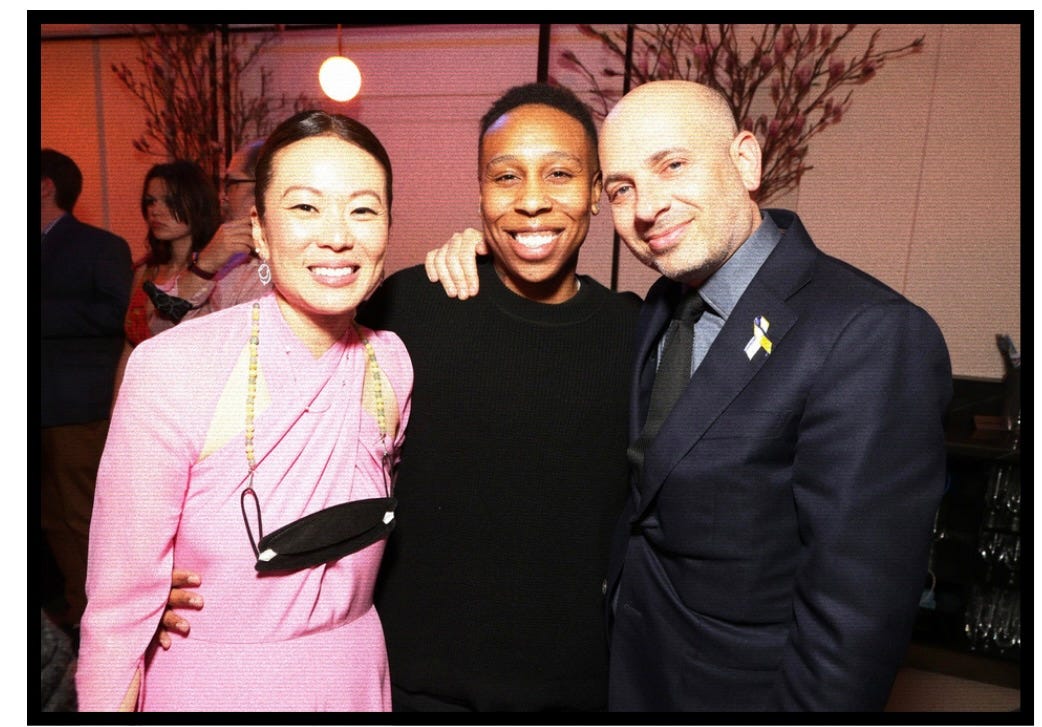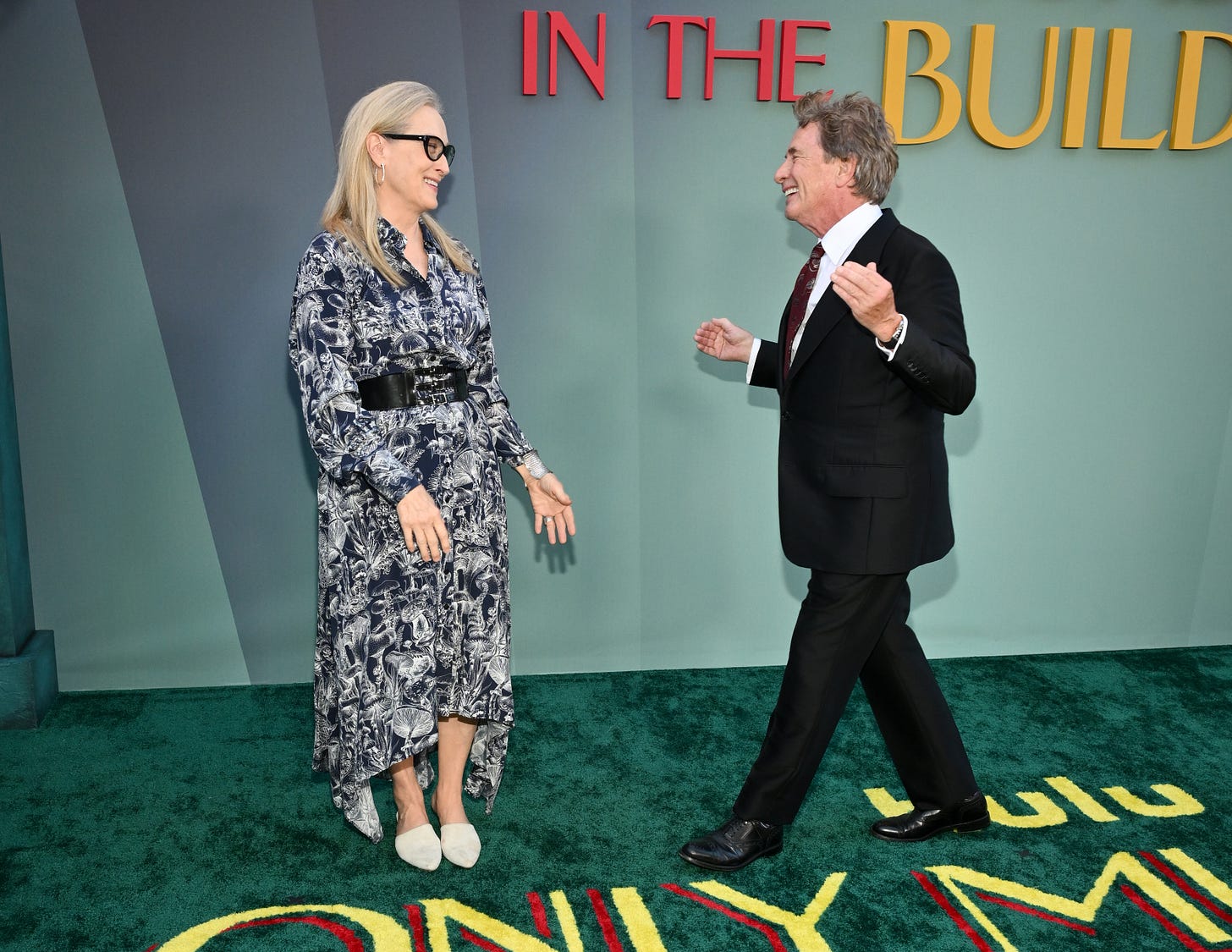'Pachinko' Creator Soo Hugh: 'Learn to Work With People Who Aren't Assholes'
The showrunner on making a show library-ready and inspiring her writers to create their own. Plus: one already complicated Oscar race

Happy Monday — and happy end-of-Emmy-voting to all who celebrate! If you haven’t yet turned in your ballot, you can still catch up on my podcast episode handicapping the tightest races. In that episode, Chris Rosen and I discussed the spoiler effect Meryl Streep might play in the race for best supporting actress in a comedy. Now that the rumored romance between her and Only Murders co-star Martin Short has reached new heights of speculation, her odds may be even higher than we realized at the time.

The Emmys themselves won’t happen for a few more weeks — first the Creative Arts awards on Sept. 7 and 8, then the main event on Sept. 15 — and by then we’ll be fully in a whole new awards season. The Venice Film Festival kicks off this Wednesday with Tim Burton’s Beetlejuice Beetlejuice, and by Thursday a different Hollywood contingent will be donning cowboy hats to head to the mountains for the Telluride Film Festival.
On tomorrow’s Prestige Junkie podcast, I get into Telluride’s history of launching awards buzz with The Ringer’s Sean Fennessey, whom like many people I know, lovingly refers to the high-altitude festival as a kind of cinephile cult. I’ll have to wait another week for my festival madness to kick in at Toronto, though the FOMO will be very real until then.
For the moment, though, I’m trying to make the most of the last week of summer. In today’s edition of the newsletter, I’ve got a conversation with Soo Hugh, the showrunner of Apple TV+’s Pachinko, which returned last week for yet another sweeping, incredibly emotional season.
But first: submissions for next year’s international feature Oscar are starting to come in — and they’re already highlighting the messiness of this category. As we’ll see, perhaps the messiness is the point.
International Incident
When a film wins the international feature Oscar, the trophy doesn’t actually go to the director or even the producers, the way best picture does. The award goes to its country of origin, or more accurately the country that has decided to submit the film to the Oscars through the fairly complex process that’s been litigated and adjusted many times over the years.
That’s why I raised my eyebrows when the trailer for the upcoming Conclave declared director Edward Berger an Oscar winner, even though his trophy for All Quiet on the Western Front technically belongs to Germany. That’s also why the Poland-set, German language The Zone of Interest marked the first win in the category for the United Kingdom, which submitted the film by the London-born Jonathan Glazer.
This year’s boundary-blurring example is sure to be The Seed of the Sacred Fig, a political thriller set in Iran and made by Iranian director Mohammad Rasoulof. Rasoulof has been living in Germany since fleeing Iran in May, under threat of arrest in his native country because his films — Sacred Fig included — are critical of the Iranian government. Rasoulof had French and German financing for the film he made in Iran in secret, so while Sacred Fig is not set in Germany in any way that’s visible onscreen, the 13-member jury in Germany that recently selected the country’s Oscar submission was eager to embrace him.
“It is an outstanding work by one of the great directors of world cinema and someone who has found refuge in Germany from state despotism in Iran,” the committee said in a statement. “We are very happy to know that Rasoulof is safe in our country. And we are delighted that he will be representing Germany at the Oscars in 2025.”
My friend Chris Feil, co-host of the This Had Oscar Buzz podcast, follows the international feature race closely each year and is constantly seeing the awkwardness of a system that requires these films with a vast array of international financing stuck being submitted by a single country. With the Iranian government entirely unlikely to submit Sacred Fig to the Oscars, leaning on the film’s German financing is a way to allow it to be seen more widely. The boundary-blurring, in other words, is a feature and not a bug.
As Chris points out, this will likely not be the only submission with little visible connection to its home country. “Should France select Jacques Audiard's not-particularly-French Emilia Perez, as it seems likely they will, Sacred Fig may not be alone this year in making the submission-by-country process seem more dated than ever.”
Soo’s On First
When Soo Hugh did press to promote the first season of her Apple TV+ series Pachinko in the spring of 2022, she usually had to do a lot of explaining first. The show is adapted from the best-selling novel by Min Jin Lee, but it’s not a simple concept to sum up. The story begins in the period in the early 20th century when Japan occupied Korea, and follows the life of a young Korean woman named Sunja who moves to Japan in the 1930s. Both the novel and the show capture multiple generations of Sunja’s family from there, creating a sweeping portrait of a family negotiating their identities between the two countries.
Hugh’s show, however, scrambles the straightforward timeline of Lee’s book, juxtaposing young Sunja’s (played by Kim Min-ha) life in World War II-era Osaka with her grandson Solomon’s (Jin Ha) experience in the late 1980s. One episode of Pachinko is enough to prove it’s an incredibly moving way to tell a family saga, but Hugh had to get audiences there first. “For season one, so much of the conversation was ‘what is the show,’” Hugh told me in a recent phone call. “I think now the conversation is a lot more interesting.”
Now back on Apple TV+ for its second season, airing weekly until October 11, Pachinko picks back up with the stories of Sunja (played as an older woman by Oscar winner Youn Yuh-jung), Solomon and their extended family. Even Pachinko’s stars, Hugh says, have gotten into the groove of this promotional cycle. “They were so much more nervous in season one,” Hugh says of the cast, which includes many newcomers among the veterans of South Korean film television. “It’s such a new experience for so many of them. This season, they’re so much more confident and relaxed.”
It’s a confidence that Hugh has earned as well. Getting her start as a writer and showrunner on series like Under the Dome and The Terror, Hugh has leveled up into a rare class of television writers with Pachinko, signing an overall deal with Apple and Media Res earlier this year. She credits the encouragement of the showrunners she worked with early in her career, like Veena Sud, Michael Green and Zack Estrin, for urging her to pursue her own show — and now she’s working to pass that on.
“I always say to my writers, the big goal is for you to write your heart out on this show,” Hugh says. “Then the bigger goal is you need to get your own show. How do we get that? I hope that just the experience of working on a show that’s ambitious, that has the high bar where you learn to work with people who aren’t assholes, is so empowering.”
The emotional tug of Pachinko is present in the “sacred space” of the writers room, Hugh says, with the writers sharing stories of their own families. It’s there on set, too, where there are boxes of Kleenex stationed by monitors and Hugh considers it her job to be a calming influence even through the biggest production hurdles.
“The attitude is that it always gets done,” Hugh says. “I always find when people freak out to be really interesting. Like, if you need to vent, that’s fine, but it’s going to work out. We just have to figure it out.”
Filmed across multiple continents and jammed full of historical detail, Pachinko is another model of the kind of “ambitious, cinematic television” Jonathan Nolan told me about recently. But Hugh also has her eye on the power of film and television libraries, and the impact shows like Pachinko can have years or decades after they first air.
“I feel like we used to believe in the value of a library — we made shows that were not going to just disappear,” says Hugh, pointing to the surprise resurgence of Suits as evidence of how shows can have long lives. “In every pitch, the question that always comes up is, ‘Why now? Why are we making this show?’ I actually would like to add a coda: ‘What does this show mean years from now?’ Not only should we be focused on the present, but let’s be focused on the future as well.”





